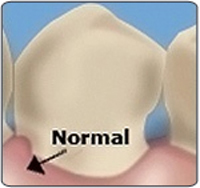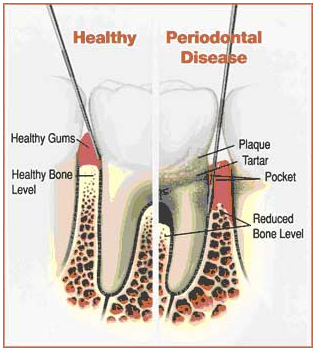|
 What
Is Gingivitis? What
Is Gingivitis?
This form of gum disease is generally caused by lack of
proper oral hygiene, which creates dental plaque buildup.
Dental plaque is that sticky, invisible film found on your
teeth. This is a bacteria that if allowed to stay on your
teeth will harden into dental tartar. This is nearly impossible
to remove with just your toothbrush. This is a hotbed of bacteria.
Dental plaque irritates your gums and will cause infection.
Your body then catapults into an immune response to attack
these aggressive invaders. Your gums get caught in the middle
and become inflamed.
What's worse is periodontal bacteria can enter your blood
stream and make its way to all of your major organs to cause
even more trouble. Research indicates this can possibly:
• Lead to heart disease
• Up your chances for a stroke
• Increase the odds that a woman will have a preterm,
low birth weight baby
• Aggravate those with already compromised health
• Contribute to medical conditions, including diabetes,
respiratory disease and osteoporosis
Warning Signs
If it wasn't already taken, gingivitis would be called the
silent killer. At this stage in the progression of periodontal
disease, there is very rarely any pain. You are more likely
to experience:
• Soft, swollen, red gums
• Bleeding gums at the slightest bit of pressure
• Color change of the gums from pink to dark red
• Pink toothbrush (and not from the toothpaste)
Inadequate oral hygiene is the number one cause of gingivitis.
Here are some other conditions that may cause, or worsen,
gingivitis:
• Medication -- can inhibit body's production of saliva,
which has a cleansing effect on your teeth
• Viral and fungal infections
• Disease
• Hormonal changes -- pregnancy
• Poor nutrition
• Weakened immune system
How Do I Get Rid of Gingivitis?
This is possible with proper gum disease treatment. We may
use scaling and root planing to remove all that dental tartar
and dental plaque. A deep cleaning can generally fix the problem
for good if you continue to practice good oral hygiene, brush
twice a day, floss daily and use anti-bacterial mouthwash.
Gingivitis, in this moderate form, is completely reversible!
Take care of your teeth, and they will stay healthy and clean!
Symptoms of Periodontal Disease
Swollen gums make brushing and flossing difficult. And bad
breath is a social nuisance. But both are actually signs of
something much more serious -- gingivitis. These symptoms
are often mild, so it's tempting to ignore them. However,
when gingivitis is left untreated it can develop into a serious
form of periodontal disease: periodontitis. Periodontitis
destroys the tissue and bone that support the teeth and can
cause tooth loss.
Other warning signs of periodontal disease include:
• Spaces developing between your teeth
• Pus between your teeth and gums
• Loose teeth
• Puffy, red, receding or bleeding gums
 What
Causes Periodontal Disease? What
Causes Periodontal Disease?
Dental plaque is the primary culprit of periodontal disease.
If not removed within 26 hours, dental plaque turns into dental
tartar, which causes periodontal disease. You can prevent
dental plaque by practicing good oral hygiene. That means
brushing and flossing regularly; visiting the dentist for
regular checkups and dental cleanings; and maintaining a well-balanced
diet.
Other factors can increase the risk of periodontal disease,
including:
Cigarettes and Tobacco -- Smoking and chewing tobacco are
two of the major causes of periodontal disease.
Genetics -- Research proves that about 30% of the population
is predisposed to gum disease.
Pregnancy -- Hormonal changes can make your gums sensitive
and more susceptible to infection.
Medications -- Certain drugs such as steroids, cancer therapy
drugs and oral contraceptives can affect your gums.
Treating Periodontal Disease
Fortunately, gingivitis is reversible with professional care
and good home dental care. Periodontitis requires more substantial
gum disease treatment, however. A non-surgical method of treating
periodontitis is the scaling and root planing procedure (SRP).
During a scaling and root planing, we perform a careful cleaning
of the root surfaces to remove dental plaque and dental tartar,
and then smoothe the tooth root to remove bacterial toxins.
Dental surgery for periodontal disease includes pocket reduction
procedures, crown lengthening and soft tissue grafts.

|


 What
Is Gingivitis?
What
Is Gingivitis? What
Causes Periodontal Disease?
What
Causes Periodontal Disease?